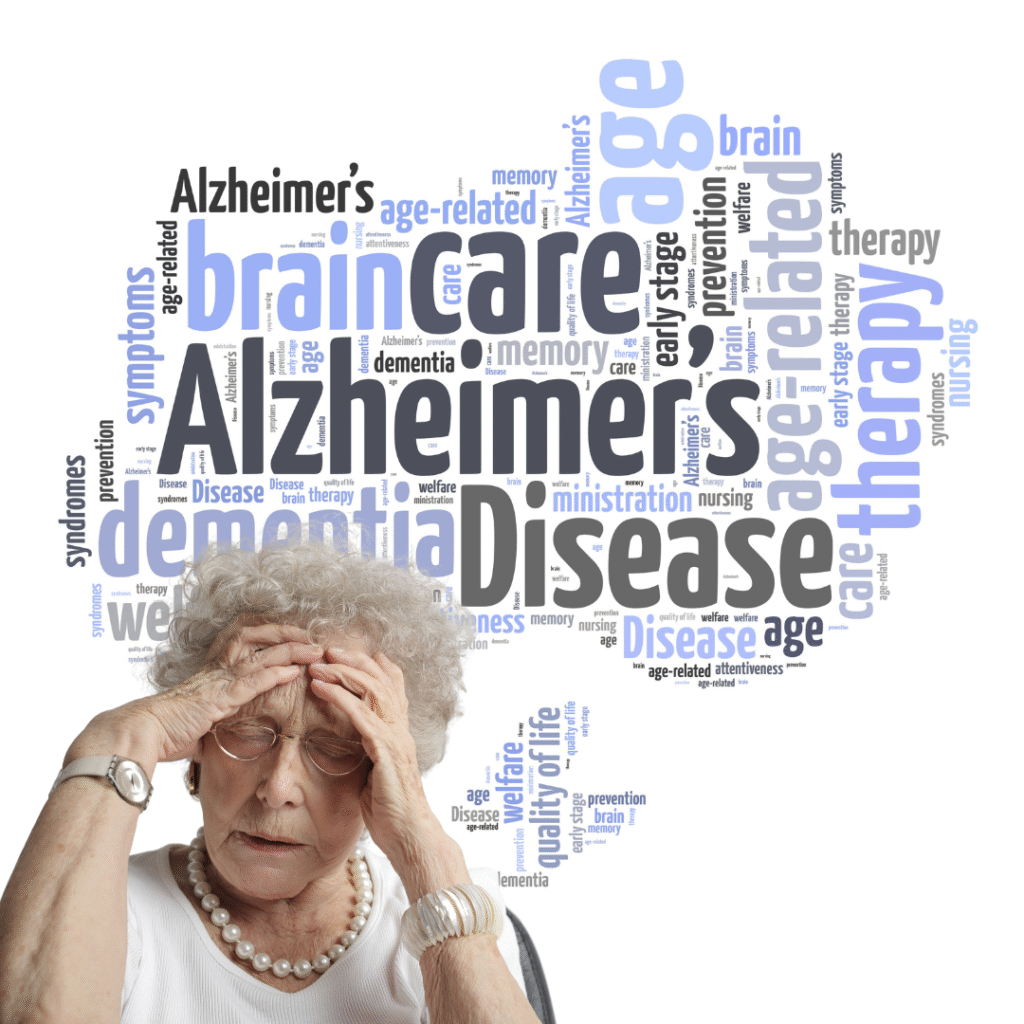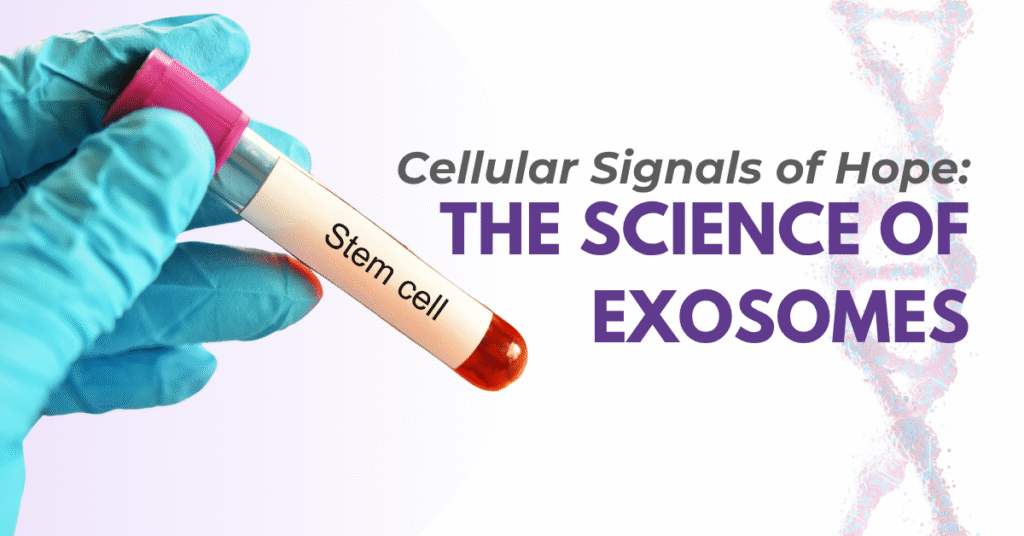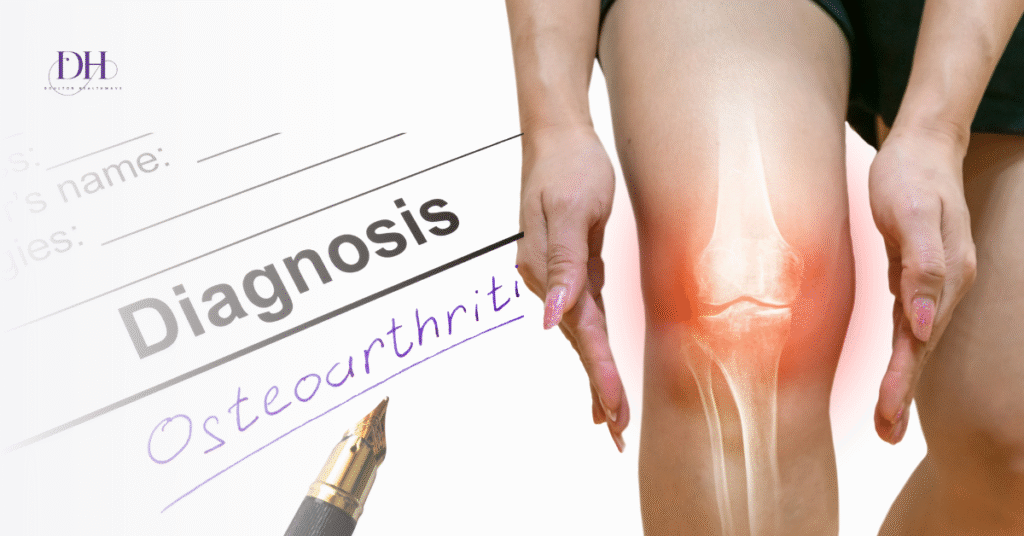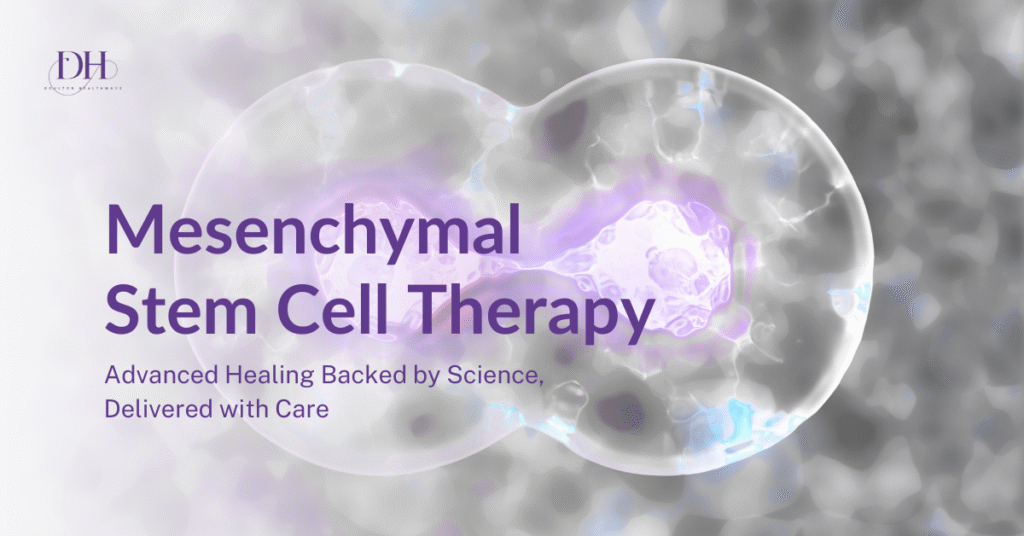Hope for Alzheimer’s: How UC-MSC Therapy Helps Restore Brain Function
When memories begin to fade UC-MSC Therapy offers a new hope. Alzheimer’s disease is more than memory loss—it gradually disrupts cognition, identity, and connection. At Doulton Healthwave, we offer a science-driven, compassionate alternative: Umbilical Cord Mesenchymal Stem Cell (UC-MSC) Therapy. Sourced ethically from Wharton’s Jelly, these younger, more potent cells show strong potential in reducing brain inflammation, protecting neurons, and supporting regeneration.

What Is Alzheimer’s Disease?
Alzheimer’s disease is the most common form of dementia, especially in people over 65. In simple terms, it happens when abnormal proteins—beta‑amyloid plaques and tau tangles—build up in the brain. These clumps damage neurons and interrupt how brain cells talk to each other
At first, symptoms may seem mild:
- Forgetting recent conversations or events
- Feeling more confused or struggling to plan
- Having difficulty finding words or speaking fluently
- Mood shifts, irritability, or personality changes
As the disease progresses, everyday life becomes more challenging. Tasks like dressing, cooking, or remembering loved ones become difficult to manage
Why We Need Awareness (and Hope, Not Pity)
Awareness matters—for patients, family members, and caregivers. Alzheimer’s is not just memory loss—it’s a profound change in identity, in how someone experiences the world. Empathy and early understanding can help:
- Reduce stigma
- Encourage early diagnosis
- Empower families with planning and care tools
This article focuses on creating hope through knowledge, lay-friendly, without selling, but with science.
Current Treatments: What Helps—and What Doesn’t Cure
Today’s standard medical treatments for Alzheimer’s—such as donepezil, memantine, and rivastigmine—are designed to manage symptoms, not cure the disease. These medications work by temporarily improving neurotransmitter activity in the brain, which may help with memory, attention, or daily functioning in some people. But these effects are often short-term and do not halt the underlying damage occurring deep in the brain
In essence, these medications are supportive tools, like using a flashlight in a dark tunnel—they may illuminate the path for a while, but they don’t change the structure of the tunnel or stop it from collapsing.
Many families describe this stage of treatment as both hopeful and heartbreaking: hopeful for even a little more clarity in a loved one’s eyes, heartbreaking when that clarity fades again. Over time, the disease continues its progression—eroding memory, speech, judgment, and identity—even when medications are used faithfully.
That’s why researchers and caregivers are increasingly looking beyond symptom control. They are exploring deeper, disease-modifying approaches—those that may slow the actual process of neuronal degeneration. At the forefront of these investigations is regenerative medicine, and in particular, stem cell therapy using mesenchymal stem cells (MSCs).
MSCs offer a completely different kind of support: not by masking symptoms, but by interacting with the immune system, reducing toxic inflammation, and potentially repairing some of the brain’s damaged connections. Unlike conventional drugs, MSCs don’t target one chemical—but rather aim to create a healthier environment for the brain to function. It’s not a miracle, but it’s a shift in how we think about healing.
For patients in the early to moderate stages of Alzheimer’s, this direction offers a different kind of hope—one rooted not in cure, but in preservation: preserving daily functions, precious relationships, and the ability to engage with life a little longer.
And while stem cell therapy is still evolving, the mounting evidence and the deeply human stories emerging from early trials suggest we are slowly, thoughtfully, moving closer to a new frontier of care.
How Can MSC Therapy Help?
Mesenchymal stem cells (MSCs) are special cells with the potential to support tissue repair, calm inflammation, and protect neurons. When sourced from the umbilical cord—specifically Wharton’s Jelly—they are:
- Ethically collected – Sourced from donated umbilical cords after healthy births, with no harm to mother or baby.
- Young and active – These early-stage cells have a high capacity for regeneration and repair.
- Naturally healing – Rich in growth factors and molecules that support brain cell survival and tissue recovery.
- Low rejection risk – Their low immunogenic profile means they’re unlikely to trigger immune responses.
- Non-invasive sourcing – No surgery or risky procedures are needed to obtain these potent cells.
Laboratory experiments and animal model studies offer growing evidence that mesenchymal stem cells (MSCs) have wide-ranging benefits for brain health—particularly in conditions like Alzheimer’s
- Reduce brain inflammation – MSCs help calm chronic inflammation that contributes to Alzheimer’s progression.
- Protect neurons – They support the survival of brain cells and slow down their degeneration.
- Repair brain connections – MSCs may stimulate the regrowth of synapses and strengthen neural networks.
- Clear toxic proteins – Research shows they can help reduce harmful amyloid plaques in the brain.
- Balance immune activity – MSCs help restore healthy immune function in the brain, preventing further damage.
What Does Early Clinical Research Show?
Several human trials have begun, though most are early phase and small-scale:
- A 2021 Phase I trial in South Korea injected human umbilical cord blood MSCs directly into the brain ventricles (via Ommaya reservoir) in nine patients with mild‑to‑moderate Alzheimer’s. It showed feasible and relatively safe results, with mild side effects like short fevers and headaches—no dose‑limiting toxicity and no serious long‑term issues after three years follow‑up alzres.biomedcentral.com.
- Another recent phase 2a randomized controlled trial using the allogeneic MSC therapy called laromestrocel (also known as Lomecel‑B) in mild Alzheimer’s supports both cognitive improvement and a better quality of life nature.com+2pubmed.ncbi.nlm.nih.gov+2investors.longeveron.com+2.
Reviews of preclinical and clinical data highlight MSCs’ anti‑inflammatory, neuroprotective, antioxidant, and regenerative roles—suggesting real, multi‑faceted therapeutic potential PMCfrontiersin.orgScienceDirectintjem.biomedcentral.com.
How MSC Therapy Works (Simple and Science‑Backed)
1. Collection & Preparation
- Wharton’s Jelly MSCs are ethically sourced and cultured under strict lab safety standards.
2. Delivery Method
- Depending on protocols, MSCs may be administered intravenously (IV) or directly into the cerebrospinal fluid (e.g., intrathecal or intracerebroventricular injection).
3. Healing Mechanisms
- Once in the body, MSCs migrate toward areas of brain stress, releasing helpful molecules—growth factors, anti‑inflammatory cytokines, and extracellular vesicles (EVs). These act to protect injured neurons, reduce toxic brain inflammation, and may help retune the brain’s immune balance ()
Importantly, these therapies do not alter DNA—they are natural, living cells working to support your body’s healing processes.
Timing Matters: When Is Therapy Most Effective?
MSCs seem most effective when used early to moderate in the disease stage—when neurons are still alive and cognitive decline is not severe. Most trials focus on people aged 55–75, though very early‑onset cases (younger individuals) are also under study frontiersin.org, ScienceDirect.
Starting sooner may preserve more cognitive function and quality of life.
Safety Profile: What Do We Know?
So far, MSC therapies in Alzheimer’s appear safe and well‑tolerated:
- No serious immune rejection
- No tumor formation reported
- Side effects limited to mild, temporary fever or headache in a few early cases (BioMed Central), (PubMed PMC12003194), (PubMed PMC8426054)
Meta‑reviews describe a strong safety profile in neural disease applications of MSCs (PubMed PMC8426054), (Bentham Science)
Transparent Summary Table
| Topic | What Science Shows |
| Disease Cause | Beta‑amyloid and tau buildup destroy brain cells and connections |
| Symptoms | Memory loss, language difficulty, confusion, mood/personality change |
| Traditional Drugs | Help with symptoms; do not slow or reverse the disease |
| What MSCs Do | Reduce inflammation, protect neurons, support regrowth, clear plaques |
| Safety in Trials | Mild transient side effects; no serious adverse outcomes |
| Stage for Therapy | Early‐to‐moderate Alzheimer’s yields best potential |
| Clinical Trial Evidence | Phase I in Korea, Phase 2a in US; promising signs |
- Easy to collect, no surgical risks
- Very young and potent, better healing effect
- Low immunogenicity, minimal rejection risk
- Rich in growth factors, exosomes, and EVs supportive of brain repair
That’s why Wharton’s Jelly MSCs are at the forefront of regenerative research and promising clinical trials. (JCN), (FrontiersIn)
What Clinical Trials Can You Explore?
For anyone seeking validated, ongoing studies:
- ClinicalTrials.gov study NCT03158896 evaluates different doses of human umbilical‑cord Wharton’s Jelly MSCs for neurological conditions, promising a structured approach to safety and effectiveness
- Many new trials are registering through 2025–2026, often indexed by condition and cell‑source type (SCI), (PubMed)
What MSC Therapy Offers (and Doesn’t)
- Can slow progression of symptoms—especially memory decline and daily living tasks.
- Supports neuron protection, immune balance, and brain tissue environment.
- Cannot reverse existing major damage or rekindle lost memories.
This is a supportive regenerative therapy, not a cure—but offers real hope where traditional medicines fall short.
Questions People Often Ask
Not Just Science—This Is About People
Behind each study, each mild improvement, there is
- A daughter who remembers her mother’s favorite song
- A spouse who can still share a meal
- A child who recognizes the grandparents
- A person who still knows their own life story
UC-MSCs are more than cellular medicine—they are compassionate science that respects memory and identity, offering caring support to those most vulnerable.
You Are Not Alone. Take the First Step.
If Alzheimer’s is in your life—whether personal diagnosis or loved one’s—early guidance and support can help with planning, care, and possibility. You deserve clarity, empathy, and options.
Here’s how you can explore further:
- Schedule a free consultation (online).
- We’ll review your diagnosis, medical history, and current stage.
- If early‑to‑moderate Alzheimer’s is present, we can guide you through whether Wharton’s Jelly MSC therapy might be an option.
- We’ll explain risks, logistics, clinical-trial access, and realistic outcomes.




